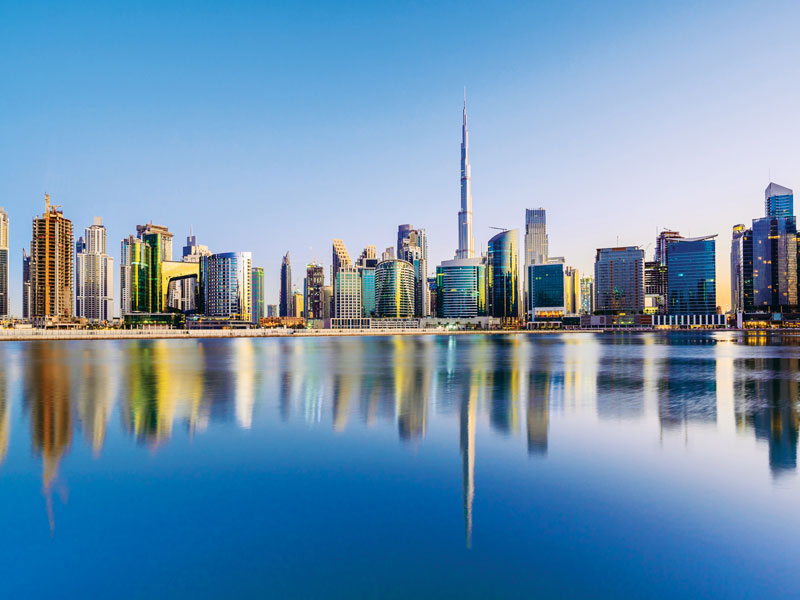
Astute observers will have noticed that the Dubai Financial Markets General Index in the UAE is up almost 30 percent in the past 12 months, with volumes rising by nearly a quarter. For comparison, the FTSE 100 has been effectively flat over the same period, the Dow Jones Industrial Average up only 15 percent, the CAC 40 in Paris up less than seven percent, the DE40 Index in Frankfurt also up a mere 15 percent and the JP225 in Tokyo up around 19 percent.
The boom in Dubai is being led by the property sector, where two giant Dubai-based companies, Emaar Properties, owner of the Burj Khalifa, the tallest building in the world, and its subsidiary Emaar Development have seen their shares rise more than 50 percent and more than 70 percent respectively this year. This has spilled over into other sectors such as banking, where Commercial Bank of Dubai, for example, saw its shares up 25 percent year-on-year at one point, and tourism, with shares in Air Arabia, the low-cost airline based in the next-door emirate to Dubai, Sharjah, rising 45 percent from their low a year ago.
The boost to Dubai’s stock market is good news for the current ruler, Sheikh Mohammed Al Maktoum, who also serves as prime minister of the UAE. In January this year he unveiled the ‘D33 Agenda,’ which has the ambition of doubling the emirate’s GDP by 2033, the year that will mark exactly two centuries since the emirate’s foundation.
The aims of the D33 Agenda focus on doubling the volume of Dubai’s foreign trade
The D33 Agenda focuses on growth, foreign investment, and trade, to turn Dubai over the next 10 years into a top-three international tourism and business destination, by creating a globally competitive business environment and reducing business costs. The aims of the D33 Agenda focus on doubling the volume of Dubai’s foreign trade, and turning the emirate into a top five global logistics hub and a top four global financial hub and a top three global destination for business and leisure visitors.
Other initiatives include bringing 65,000 young Emiratis into the labour market in promising sectors, and launching an initiative called ‘Sandbox Dubai,’ which will allow the testing and marketing of new products and technologies, to make Dubai a hub for incubating innovations.
Potential investors in the emirate are being wooed with policies such as zero percent income and corporation tax in Dubai’s free zones, and only five percent value-added tax. The emirate is already the largest recipient of foreign direct investment in the Middle East, and is looking for investors and partners from overseas in nine different sectors, from healthcare and pharmaceuticals to trade and logistics, and from finance to aviation – and even interplanetary exploration.
Outperforming larger rivals
Dubai is effectively promised a dynamic property sector thanks to forecast growth in the emirate’s population of 75 percent by 2040. Historically the Dubai property market has easily outperformed bigger rivals, with real estate assets generating 120 percent returns for investors in rents and capital in the 10 years since the global financial crisis of 2008, against 75 percent returns in London and 63 percent in New York.

At the same time Dubai remains one of the cheapest major cities in the world for the wealthy to make a home: in 2022 $1m would buy 105 square metres of luxury property in the emirate, against just 21 in Hong Kong, 33 in New York, 34 in London and Singapore, 44 in Shanghai, 60 in Tokyo and 70 in Berlin.
The recently passed Foreign Direct Investment Law allows foreign ownership in onshore companies up to 100 percent, depending on the industry. Administrative processes have been simplified to allow certain professional service activities to be established online by investors from nearly 120 countries.
Oxford Economics, which promotes itself as the world’s foremost independent economic advisory firm, predicted in October this year that the UAE economy would grow by 4.4 percent in 2024. The firm said growth was being driven by a number of factors, including government initiatives to support economic diversification. Scott Livermore, chief economist at Oxford Economics Middle East, said he expected continued growth in the property market and a strong recovery in travel and tourism, with Dubai surpassing pre-pandemic visitor levels by the first half of 2023. He said he expected a 40 percent increase in international visitors to the UAE this year, driven by the UAE’s National Tourism Strategy ambition to become a major global tourist destination by 2031.


